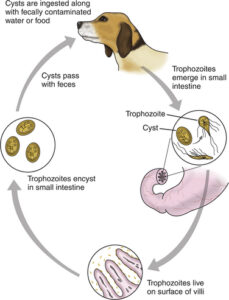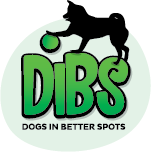If you have had a puppy, you may have experience with a dog with Giardia! But if it’s new to you, let us share what we know!
Who: Puppies or unhealthy dogs are more susceptible due to a weakened immune syste. Healthy adults tend to fare better and fight the bug on their own. 
What: It is not a worm, bacteria or virus, but is instead a parasite. In people, it is what we often refer to as Travelers Diarrhea. It’s basically a parasite spread by fecal matter.
When: Giardia will flare up 5-12 days after ingestion. It’s most commonly spread during puddle season, as our dogs tend to love to drink out of puddles that other dogs have walked through. As it’s spread via poop, a rainy day will spread a pile of poop to a larger area.
Where: Worldwide! This is an everywhere issue. Our bodies are not meant to ingest poop, so giardia can be in any country where a dog may poop.
How: Ingesting fecal matter. Treatment is typically metronidazole or fenbendazole, and are normally given for three to ten days to treat giardiasis.
Symptoms
Many dogs may never show signs of infection, especially when the diet is good and their immune system is actively engaged. But the most telling sign is the look and smell and frequency of bowel movements. The diarrhea may be intermittent, acute or chronic. Take it from us: this poop looks different! There may be slime and mucusy blood. (google it!) And, the smell! It’s in a league of it’s own (IYKYK). Some secondary symptoms could be, weight loss, failure to gain weight, vomiting, dehydration, poor coat appearance.
Preventative Stuff
- Give your dog a healthy diet, and consider supplements if you have a younger dog that needs to grow into their immune system
- Pick up poop immediately: keep your yard clean
- Tell your dog not to drink from puddles (easier said than done!)
- Walk around puddles but if your pups paws may be contaminated, wash them off as soon as you get home.
- Clean your dogs water bowl daily.
Gross Stats:
- There is a good chance your puppy will get it!
- In developed countries 1 to 7% of people are infected with Giardia and don’t know it because they are not ill (this has nothing to do with dogs at all, but we thought we’d share!). In people, we may refer to bouts of giardia as “travelers diarrhea”
- In North America about 7% of dogs carry Giardia
- 70% of dog park dogs, will get Giardia
- 1-40% of shelter dogs will get Giardia
Our Journey
We find that most of our dogs may have an upset stomach (aka funky poop) for a few days after they arrive.
- Our first thing to rule out is stress, both from the travel and their arrival in a new home/situation.
- The other thing to consider is food sensitivities. Our dogs are well fed while they are in the shelter, but when they arrive to their foster home, the brand is changed and there may be treats provided. The change in diet can affect their digestive processes, but this typically settles after a few days.
- If the upset stomach continues, we ask our foster parents to switch to a rice only diet (no kibble, no treats…literally rice only!) to allow their stomach to settle. We compare this to ourselves having an off system and we gravitate towards saltines and ginger ale. The rice only diet (sometimes made with a chicken or beef stock for a bit of extra flavour) gives the stomach time to settle down. This stage of the process should last 3 days or so, but some dogs may take longer to heal.
- If the funky poop persists through the rice diet, there is a good chance that it is giardia or even worms. We notify our vet that we will be bringing in a poop sample for testing and we ask them to test for both giardia and worms.
- We have yet to have a worm diagnosis, but if we did a simple de-wormer would be provided (typically 2 treatments, 15 days apart)
- About 30% of the time we are told “yes, this is giardia” and the typical treatment is metronidazole.
- In the foster home, existing dogs typically don’t get giardia from the foster pup as the existing dogs have a more robust immune system.
- When giardia is not the cause, the vets typically put the dogs on a vet grade gastrointestinal food, which takes over for the rice diet and helps the stomach settle. Non-vet food would include Purina Pro Plan for sensitive stomachs is a great solution and we always add Purina Fortiflora as the best probiotic if your dogs poop/stomach is off.
Do know, we are not vets. We are just foster parents that have seen this a few times and have shared stories amongst each other. If your dog has funky poop, it may be giardia, but don’t panic! A trip to the vet and some meds will get them back on track! A good diet and lots of exercise will get your pup healthy and beef up their immune system.
Here are some of the recent articles we have referenced: do check them out! And talk to your vet about it, if you suspect giardia!
- https://vcacanada.com/know-your-pet/giardia-in-dogs
- https://www.wormsandgermsblog.com/files/2008/04/M2-Giardia-Owner1.pdf
- https://getdiglabs.com/blogs/the-dig-labs-dish/dont-be-deceived-giardia-in-dogs
